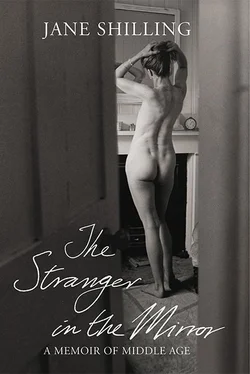At 40, the Wife of Bath has been married five times, most recently to a 20-year-old scholar, Jankin, whose lovely legs caught her eye at her fourth husband’s funeral. (The coupling of middle-aged women with much younger men was a far less outré phenomenon in past centuries than its contemptuous modern label of ‘Cougar’ implies.)
The Wife brings a stringent clarity to the volatile cocktail of sex, power and money that is domestic life. She has a strong sense of the kind of ménage that will suit her, and she has bent all five husbands to her will, by browbeating, sexual manipulation or, on occasion, violence. There is a sharp intelligence about her understanding of her own appetites – for sex, money, admiration, amusement and good clothes (Chaucer describes these in detail: red stockings, fine linen, fashionable shoes of buttery-soft leather) – that extends even to her sense of regret about growing old.
Lord, she says, how it makes her laugh, now, to think of the high old time she had when she was young: ‘But age, allas! that al wol envenyme,/Hath me biraft my beautee and my pith;/Lat go, fare-wel, the devel go therwith!/The flour is goon, ther is na-more to telle,/The bren, as I best can, now moste I selle;/But yet to be right mery wol I fonde…’
I was captivated by that ‘Lat go, fare-wel, the devel go therwith!’ – the stylishness and courage of it: the antithesis of the ludicrous process of shoring up my ageing face that I’d undergone in the Wigmore Street beauty salon. And I was intrigued by the idea of selling the bran now the flour had gone. My success in selling the flour when I was younger had not been very conspicuous. But who knew – perhaps, with the newfound courage and self-knowledge of middle age, the bran might yet find a taker. Of all the things bothering me about the future, it was the lack of love that gnawed me most sharply.
From the inchoate mass of anxiety that was my feeling about growing older, some ideas began to form. The Wife of Bath’s distinctive autumnal pragmatism, her determination to squeeze from life whatever last drops of sweetness it might still hold, seemed more attractive, more possible as a formula with which to affront the future than any of the alternatives I’d yet encountered. I liked her voracious hunger for pleasure of all kinds, her keen instinct for self-preservation and her unapologetic determination to mould life into a shape that suited her.
Everything I read about middle age in my own era stressed that it was a time for women to begin feeling extremely apologetic about themselves. The proper occupation of middle-aged women, the newspapers and magazines and television programmes and menopause self-help books made punishingly clear, was to take whatever steps – cosmetic, sartorial, surgical, pharmaceutical – might be necessary to conceal for as long as possible the shocking reality of lost youth. The only alternative was a sort of licensed institutional battiness.
All my life I had been apologetic – the infallible mark of a child who thinks itself unloved. But now I began to wonder if the changes of middle age might include gains as well as losses. Perhaps, even so late, I could learn how not to be apologetic. Age would narrow the range of things I might wish for, but I began to consider whether there might still be time in which to please myself.
If the Wife of Bath is a sketch, a perfect miniature of a woman living her middle age with ingenuity and relish, Colette’s great belle époque courtesan, Léa, heroine of Chéri and its sequel, The Last of Chéri , is the finished portrait. Stephen Frears’s movie adaptation captured none of the nuance and hard-won grace of a woman who has learned to face life without illusions – or rather, who has learned which illusions are worth preserving and which must be jettisoned in the casting overboard of half a lifetime’s ballast that is one of the disciplines of middle age.
Léa’s regret for the passing of her own physical allure has about it something of the steely objectivity of a racehorse trainer who realises that his great champion has passed its peak and now faces a future that has shrunk to just two alternatives: a well managed decline, or a badly managed one.
Schooled by decades of having exchanged the illusion of love for the solid stuff of financial independence, Léa still places the real thing at the head of her hierarchy of what makes a life worth living: the sensual housewife’s list of good food, excellent clothes and jewels, a well run household, friendship (of the sharp-edged, beady-eyed female variety) and a seasoning of gossip and intrigue. The luxury she denies herself is that most commonly resorted to by women of a certain age who haven’t made a living from love: nostalgia.
When the novel begins Léa is 49 and Chéri, her lover of six years, is 24. When he leaves – a little sooner than she had anticipated – to make a suitable marriage to a girl his own age, Léa takes it well, makes little fuss, falls back on her well-regulated habits as armour against the terrible intimations of mortality brought on by the end of this, her last love affair.
Of course the perturbation of her climacteric isn’t as easily resolved as that. There follows a bitter struggle in which she experiments with as many different personae as an adolescent trying out adulthood for size. She plans cosy soirées of knitting and poker with her friend and rival (and fellow former courtesan), Chéri’s terrible old mother, Charlotte. ‘Do you knit?’ enquires Charlotte, startled. ‘Not yet,’ replies Léa. ‘But it will soon come…’
When Chéri returns it seems, for the space of a few blissful hours, as though all the confusion is resolved. But at dawn the idyll falters. Jaded, Chéri watches through his eyelashes the figure of his lover, ‘not yet powdered, a meagre twist of hair at the back of her head, double chin and raddled neck… exposing herself rashly to the unseen observer’.
Watching him from the window as he leaves, Léa sees him pause in the courtyard and imagines for a moment that he is coming back. Catching sight of herself in the long mirror, she wonders who the old woman is, gesticulating crazily, and in the same instant sees her lover look up at the spring sky and take a long breath, like a man released from prison.
‘I invented Léa as a premonition,’ wrote Colette. Her biographer, Judith Thurman, remarks tartly that Colette wrote her endings so that she did not have to live them herself. But although the metamorphosis of Léa from idolised blonde beauty to rich middle-aged demi-mondaine to (in The Last of Chéri ) grossly obese and unsexed old woman, appals the reader as it appals Chéri – and for the same reason: that it brings us face to face with our own mortality – the premonition is not without ambiguity.
Stephen Frears joked that he filmed only the first of the Chéri novels because he could hardly expect his star, Michelle Pfeiffer, who was then 50, to play fat and old. It is hard, in fact, to imagine a modern Léa abandoning the struggle to keep her looks. The money that her beauty earned in the first half of her life would be spent in the second on preserving her beauty by every stratagem of the surgeon’s art. Liposuction, a strict regime, perhaps a gastric band, would banish the slab-like carapace of fat; Botox and chemical peels would preserve her dewy skin from weathering into the ‘varnished hide’ that so repels Chéri when he meets his former love at 60.
In fact, if a modern Chéri were to return to his mistress eleven years after their first parting, the chances are that he would find her scarcely changed. There would be no metamorphosis, no catastrophic confrontation, no tragedy. Just an interminable synthetic idyll, with the dying fall that makes the last assignation between Léa and Chéri so poignant vanquished by HRT and Restylane.
Читать дальше












